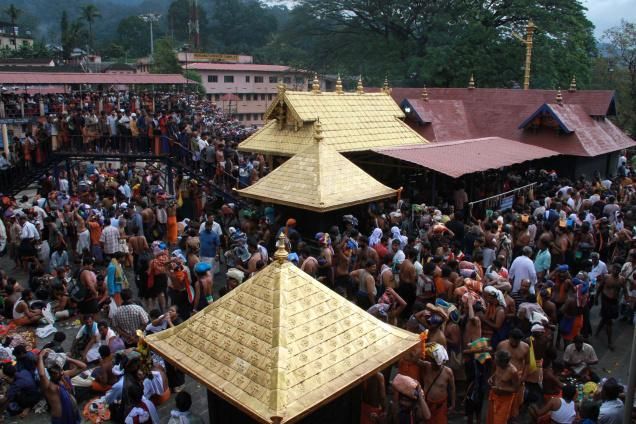'We will talk to Muslim, Christian organisations and form a broad alliance so that every temple, church and mosque will have freedom to manage their affairs and not to be intervened upon.'

Minutes after the Supreme Court ruled 4:1 in favour of allowing women's entry into the Sabarimala temple, social activist Rahul Easwar, president of the Ayyappa Dharma Sena and one of the activists who backed the ban on the entry of women between the ages of 10 to 50 inside the shrine, said he would file a review petition against the verdict next week.
"When the senior judge herself says it is not female discrimination, don't you think we have grounds for a review?" Easwar asks Rediff's Syed Firdaus Ashraf.
How do you react to the verdict?
We will file a review petition and approach the Supreme Court in the first week of October. Hopefully, the new Chief Justice of India will be more culturally sensitive.
Let us see where it goes as the Dharma Sena and other Hindu organisations are going to file a review petition.
Justice Indu Malhotra, the lone woman judge on the bench, passed a dissenting judgment and said 'Issues which have deep religious connotation should not be tinkered with to maintain a secular atmosphere in the country.'
That in itself is a great victory.
Even the woman judge felt it is not discrimination. So how can a male feel this is discrimination?
When the senior judge herself says it is not female discrimination, don't you think we have grounds for a review?
Justice Malhotra said worshippers should decide a religion's essential practice. If we accept that, would outlawed practices like sati, dowry, child marriage, the ill-treatment of widows not continue?
Let us not compare apples and pineapples. These are two different issues altogether.
Those were bad practices, wrong practices. This is not a wrong or bad practice.
We are, therefore, going back to the Supreme Court for a review.
We will approach them on two grounds -- one will be Article 25, and the deity's rights should be protected.

Article 26 of the Constitution gives every religious group the right to establish and maintain institutions for religious and charitable purposes, manage its affairs, properties as per the law.
What does this judgment mean to Article 26?
Exactly. Article 26 and Article 27 stand diluted.
These are Fundamental Rights guaranteed by the Constitution so we will have to fight. That is the reason we are saying we will file a review petition.
Chief Justice Dipak Misra in his judgment said devotees of Lord Ayyappa do not constitute a separate religious denomination.
We are not a denomination. We are only vouching for the deity's rights.
Justice Malhotra said this verdict will have far-reaching implications on other places of worship.
Absolutely yes. This why this verdict needs to be analysed; a much more balanced verdict should have come.
We are vouching for it and fighting for it.
We will also talk to different Muslim, Christian organisations and form a broad alliance so that every temple, church and mosque will have freedom to manage their affairs and not to be intervened upon.
The court permitted women's entry into the Shani Shingnapur temple and the Haji Ali dargah.
They are not comparable. Every temple is unique.
We cannot compare Sabarimala to Haji Ali and Shani Shingnapur.










 © 2025
© 2025